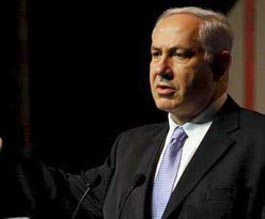|
World Jewish News

Prime Minister Benjamin Netanyahu (photo by Haaretz)
|
Netanyahu makes final push to foil Swedish plan to divide Jerusalem
06.12.2009, Israel Israel and the Palestinian Authority are each lobbying European Union foreign ministers to adopt its respective position on Sweden's initiative to recognize Jerusalem as the capital of both Israel and Palestine. The proposal is to be discussed Sunday in Brussels at the meeting of foreign ministers of EU member states.
Prime Minister Benjamin Netanyahu has phoned several European leaders, including German Chancellor Angela Merkel and Spanish Prime Minister Jose Luis Zapatero, asking them to oppose the plan and to pressure the PA to renew negotiations with Israel.
Meanwhile, in an attempt to counter Israeli pressure, PA Prime Minister Salam Fayyad convened a group of European diplomats to ask them to support the Swedish proposal.
Sweden's initiative calls for the division of Jerusalem and the recognition of East Jerusalem as the capital of Palestine. The 27 European foreign ministers are to discuss a draft of the proposal, which is expected to be published on Tuesday. The draft proposal also reportedly hints that the European Union would recognize a unilateral Palestinian declaration of independence.
In weekend discussions to prepare for tomorrow's meeting the foreign ministers could not agree over the formulation of the resolution. According to senior officials in Jerusalem as well as European diplomats, the main areas of disagreement were the status of Jerusalem, possible EU recognition of a Palestinian state and the extent of support by Israel's government of the 10-month construction moratorium in West Bank settlements.
Sweden, with the support of Britain, Ireland, Belgium and a number of other countries, continues to promote its original formulation of the proposal calling for East Jerusalem to be the capital of the Palestinian state. France, however, is pushing for a formulation that conforms to a speech that President Nicolas Sarkozy made to the Knesset two years ago. Sarkozy said that Jerusalem would be the capital of both countries and did not mention a division of the city into East and West Jerusalem. The French are also trying to promote a more definitive declaration of support for the construction freeze.
When Netanyahu spoke Thursday to Zapatero, whose country will take over the rotating presidency of the EU from Sweden next month, he told the Spanish prime minister that the EU should not determine the outcome of the negotiations on a final status agreement between Israel and the PA. On Tuesday Netanyahu gave a similar message to Merkel.
Meanwhile, National Security Adviser Uzi Arad phoned his French counterpart, Jean-David Levitte, and apparently also called British Foreign Policy Adviser Simon McDonald. During a meeting last week in Athens with the foreign ministers of Spain, Poland, Hungary and the Czech Republic, Foreign Minister Avigdor Lieberman said he hoped the wording of the resolution would be changed.
In meetings on Thursday in Ramallah and East Jerusalem, Fayyad asked European diplomats to support the Swedish resolution in its present form.
In an interview with the Saudi daily Al Watan, Palestinian Foreign Minister Riad Malki said the PA was working to get the Arab states to pressure the European countries to accept the Swedish resolution. He said such a resolution was another step on the way to a United Nations Security Council resolution outlining the borders of the Palestinian state based on the pre-1967 borders.
Malki told Al Watan that he has spoken with European foreign ministers about adopting the Swedish proposal as it stands, and that Arab foreign ministers were summoning European ambassadors to ask them to transmit messages in support of the Swedish proposal to their capitals. Malki said a major effort was being made to gain the support of French Foreign Minister Bernard Kouchner.
Meanwhile, Israel is continuing in its efforts, together with the United States, to advance a renewal of negotiations with the PA. Netanyahu's envoy Yitzhak Molcho met secretly a few days ago in New York with the U.S. special envoy for the Middle East peace process, George Mitchell. The two discussed developments in the PA ahead of the meeting of the Palestine Liberation Organization Central Council in Ramallah on December 15. On Friday, after the talks with Molcho, Mitchell phoned Palestinian President Mahmoud Abbas and discussed the possibility of renewing talks with Israel.
By Barak Ravid, Haaretz Correspondent
Haaretz
|
|
